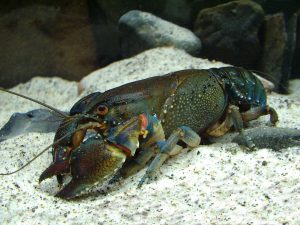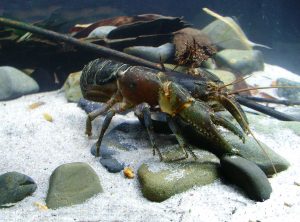Major federal grant to help save the spiny crayfish following bushfire impacts
Spiny crayfish from the Euastacus genus are an inconspicuous casualty of the widespread and enduring bushfires that profoundly impacted Australia over 2019–20. As with other freshwater animals, spiny crayfish were not only directly impacted as the bushfires swept over the landscape but also following subsequent rainfall and runoff that has delivered ash and sediment into waterways from burnt areas. These impacts may continue for these species for months and even years and threaten ongoing survival.
Nick and Sylvia recently received confirmation that their ‘Saving the Spinys: urgent actions to conserve the Euastacus freshwater crayfish’ grant was one of 19 projects funded by the Australian Government through the first tranche of its Wildlife and Habitat Bushfire Recovery Program.
The project, focusing on the recovery of all 22 priority bushfire-impacted spiny crayfish species, represents the most significant investment in the conservation of these spiny crayfish species to date. It is a collaboration between world-leading experts on freshwater crayfish from Arthur Rylah Institute for Environmental Research, Australian Aquatic Biological, Australian Museum, University of Canberra, Deakin University, Griffith University, University of Poitiers (France) and the Queensland Department of Environment and Science. The project has the following key objectives:
- Determine the extent of range limits, identify critical remnant populations and threats to those populations
- Resolve taxonomic status of the undescribed priority species and identify evolutionarily significant units within established species, develop genomic markers and eDNA to support range mapping
- Explore feasibility of conservation translocations (including ex situ production)
- Undertake a Species Expert Assessment Plan to inform EPBC assessment and guide recovery plans and actions
The project provides an opportunity to redress knowledge deficiencies, assess the impact of the bushfires and set the strategic platform for the long-term conservation of each species. It will also provide a means to promote each of these poorly known species and help incorporate their plight into management.
#BushfireRecoveryAU


